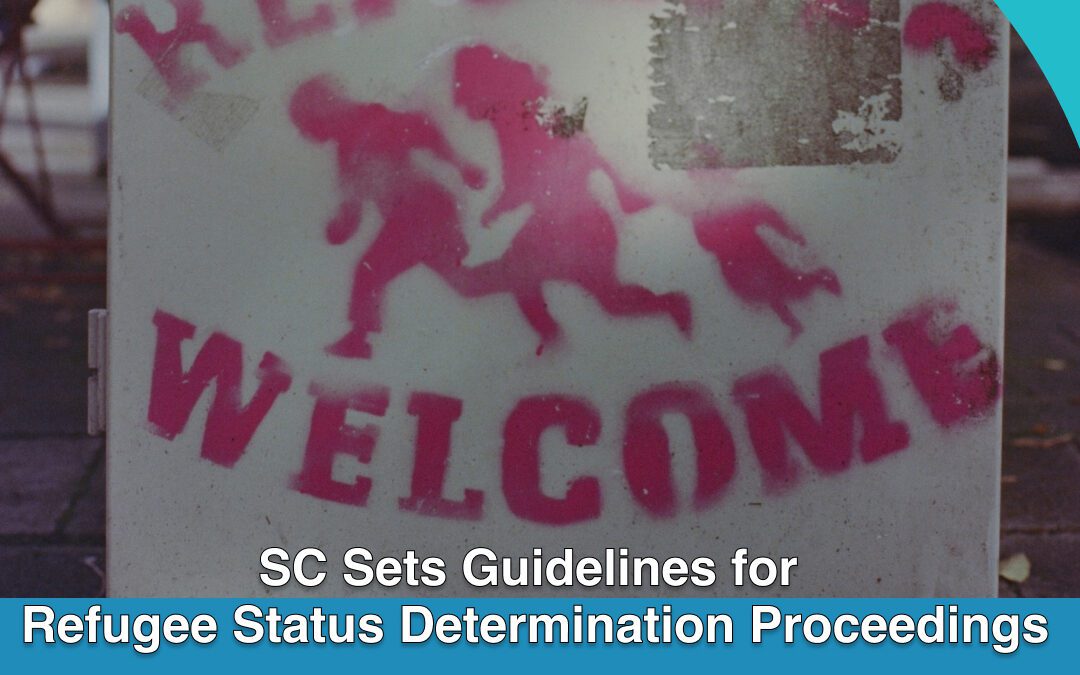The determination of refugee status is a shared responsibility between the applicant and the officer tasked to evaluate the applicant’s claim.
Thus ruled the Supreme Court in a 30-page Decision penned by Justice Rodil V. Zalameda, partly granting the Petition for Review on Certiorari filed by Rehman Sabir, a Pakistani national seeking refugee status in the Philippines. Sabir was assailing the Court of Appeals’ Decision dated January 31, 2019 and Resolution dated September 10, 2019 which affirmed the decisions of the Department of Justice-Refugees and Stateless Persons Protection Unit (DOJ-RSPPU) denying Sabir’s application to be recognized as a refugee in the Philippines.
Sabir, a Christian, was prompted to flee to the Philippines after an incident in 2016 in his native Pakistan where he accidentally dropped the Quran, following aggressive invitations for him to convert to Islam. According to Sabir, dropping the Quran is considered as insulting to Islam and can be a basis for criminal charges under Pakistan’s Blasphemy Law. Sabir also claims that, as a result, he was in danger of being killed by the local Muslim community.
On March 10, 2017, however, the Justice Secretary, through the DOJ-RSPPU, denied Sabir’s application for refugee status in the Philippines. The DOJ-RSPPU found that Sabir’s claims did not sufficiently establish he was at risk of persecution in his home country.
The Justice Secretary also held that risk of blasphemy allegations is generally not enough to make out a claim under the 1951 United Nations Convention Relating to the Status of Refugees (1951 Refugee Convention), unless there is evidence that the blasphemy charge is actually pursued.
The Court of Appeals sustained the findings of the DOJ-RSPPU, forcing Sabir to raise the matter to the Supreme Court.
The Supreme Court, in partly granting Sabir’s Petition, found that the DOJ-RSPPU failed to observe its own procedure for the determination of refugee status as laid down in DOJ Circular No. 058-12. Under Sec. 9 of the Circular, the responsibility of proving a refugee status claim is a shared and collaborative burden between the applicant and the protection officer.
“The shared and collaborative burden means that the protection officer, who is a DOJ-RSPPU officer, should actively assist and help the applicant clarify his or her claims and allegations in support of the application. This assistance could be in the form of helping elucidate the claims of the applicant, requesting the Department of Foreign Affairs (DFA) to contact foreign States, providing the applicant with translation services, and extending assistance in gathering evidence in support of the application, among others,” said the Court.
The Court held that the rationale for the shared burden of proof is “in recognition of the possibility that some applicants may have left their country in haste, and as such, may not have any evidence to prove their claims. Moreover, there may be other factors which may hinder applicants from fully discussing their allegations, including language barriers and personality differences. In these cases, the protection officer is expected to assist and help the applicant clarify his or her account.”
In Sabir’s application, however, the Court found that the DOJ-RSPPU fell short of its duty to have a shared and collaborative burden with Sabir, by exerting efforts to clarify and understand his statements.
The Court found that it was not shown whether Sabir, who does not easily understand English, was provided with an interpreter, despite his right to have one. “Not being proficient in English, petitioner may not have accurately portrayed the nuances of his situation in Pakistan,” said the Court.
The Court added that even assuming that there are inconsistencies in Sabir’s account, a further interview may be conducted by the DOJ-RSPPU to clarify and resolve any contradictions in his statements.
“In fact, unless there are good reasons to the contrary, the DOJ-RSPPU is even called to give an applicant the benefit of the doubt,” ruled the Court.
The Court thus ordered the case to be remanded to the DOJ-RSPPU to consider the factual issues that still need to be threshed out in light of the clarifications on the refugee status determination process.
“The DOJ-RSPPU is urged to actively discharge its burden in assisting petitioner to elucidate his claim. Reception of further evidence, conduct of additional interviews, in-depth study of country-of-origin information, and assessment of petitioner’s averments to a greater extent are thus encouraged,” the Court ordered.
The Court also directed the DOJ-RSPPU to assess the evidence based on the following, which shall serve as guidelines for refugee status determination proceedings:
- To discharge the shared and collaborative burden between the applicant and the protection officer: (a) the applicant must provide accurate, full, and credible account or proof in support of his or her claim, and submit all relevant evidence reasonably available; and (b) the protection officer must assist and aid the applicant in explaining, clarifying, and elucidating his or her claim.
- Notwithstanding the protection officer’s shared burden, it is also the duty of the protection officer to assess the credibility of the statements of the applicant and the evidence on record.
- The facts, as ascertained, should be applied to the definition of a refugee under the 1951 Refugee Convention and the 1967 Protocol, considering the subjective element (credibility of the applicant based on his or her statements, the evidence presented, and the applicant’s demeanor and responses to questions) and the objective element (situation in the country of origin) of the phrase “well-founded fear”. The protection officer should determine if the applicant has established, to a reasonable degree, that he or she would have been persecuted had the applicant not left his or her country of origin or would be persecuted if the applicant returns thereto.
Under the 1951 Refugee Convention and the 1967 Protocol, to which the Philippines acceded on July 22, 1981, a refugee is a person who, owing to well-founded fear of being persecuted for reasons of race, religion, nationality, membership of a particular social group or political opinion, is outside the country of his or her nationality and is unable or, owing to such fear, is unwilling to avail himself or herself of the protection of that country; or who, not having a nationality and being outside the country of his former habitual residence as a result of such events, is unable or, owing to such fear, is unwilling to return to it.
FULL TEXT of G.R. No. 249387 dated August 2, 2022 at: https://sc.judiciary.gov.ph/31811/
FULL TEXT of the Concurring Opinion of Senior Associate Justice Marvic M.V.F. Leonen at: https://sc.judiciary.gov.ph/31825/
FULL TEXT of the Concurring Opinion of Justice Alfredo Benjamin S. Caguioa at: https://sc.judiciary.gov.ph/31829/

